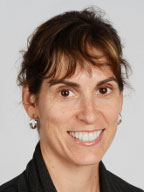Obesity prevention in the early years

Who?
Kristi B. Adamo, Children's Hospital of Eastern Ontario Research Institute
What's the Issue?
It is known that obesity tracks very closely from childhood to adolescence to adulthood meaning that if you have trouble maintaining a healthy weight as a child, you are likely to struggle with these very same issues throughout life. As a woman, a mother and a researcher I am keenly interested in how to facilitate optimal child growth and development. Thus, my research program is related to obesity prevention in the early years and targets two key periods; pregnancy and the preschool years. Prenatal life is a critical period for the development of obesity and evidence is mounting regarding the importance of the maternal obesity, gestational weight gain and intrauterine environment on the cycle of obesity. This presents a clinically-relevant problem that needs to be addressed in order to attenuate the incidence of overweight and obesity in both mom and child. We are also keenly aware that the landscape of childcare in the developed world has changed dramatically over the last two decades, with the vast majority of children now attending some form of daycare during their preschool years. More than half of Canadian children between the ages of 6 months and 5 yrs are enrolled in some form of non-parental care. Research indicates that social and physical environments where children spend their time have a powerful influence on behaviour and we believe that targeting the preschool years is essential, not only because this critical phase is reflective of the adiposity rebound but also its importance in the development of motor skills, physical activity, eating and sleeping patterns.
What's the Research?
First we are are leading the development of a pan-Canadian intervention study (SMARTMoms-Canada) that will evaluate a mobile phone application ─ designed by our colleagues in Baton Rouge, Louisiana ─ to help pregnant women adhere to current gestational weight gain guidelines, improve maternal-fetal health and attenuate the intergenerational cycle of obesity (fewer big babies, less post- partum weight retention and subsequent obesity in mom). Second my team is leading the Activity Begins in Childhood (ABC) randomized controlled trial. The objective of this trial is to identify if we can positively influence physical activity patterns in preschoolers through a daycare provider-directed intervention, aimed at increasing the amount of physical activity preschoolers are engaged in throughout the day. This 3-arm cluster trial will test whether the ABC intervention alone or in combination with a parent-driven home physical activity promotion component results in positive change in preschoolers physical activity levels, sedentary time, fundamental and gross motor skills and body composition compared to traditional daycare curriculum.
What's the Impact?
The "early years" continuum is an opportune time for encouraging and promoting the adoption of healthy behaviour patterns and appropriate knowledge translation/dissemination to care providers, educators, parents and policy makers related to this critical period.
- By helping expectant mothers reach their full health potential, we will ultimately be helping their unborn child as well as their family, achieve healthier clinical outcomes.
- Opportunities for physical activity and motor development in early childhood may, over the lifespan, influence health behaviours contributing to the maintainence of healthy body weight and reduction of cardio-metabolic disease risk.
Links to Other Resources
Dr. Adamo is a key member of both the Canadian Obesity Network's 5As of Healthy Pregnancy Weight Gain working group and the Society of Obstetricians and Gynaecologists of Canada's Nutritional Needs of Women Through the Lifespan working group and recently hosted the 2013 Canadian Obesity Summit workshop 'Obesity and Fetal Programming: How Important is 9 Months Anyway?'. She speaks regularly to Early Years Professionals groups and is a member of the Scientific Advisory Board for the Start2Finish: Running and Reading Clubs.
For more information about Dr. Adamo's and her colleagues' work, please visit the Healthy Active Living and Obesity Research Group (HALO) website.
- Date modified: